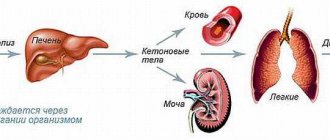A foreign taste in the mouth not only causes discomfort and prevents you from enjoying your favorite food, but also often indicates health problems.
The occurrence of a metallic taste in the mouth is familiar to a large number of people: this sensation is not the most pleasant, but not all of those who have encountered it try to find out its cause. There is nothing wrong with if the iron taste in the mouth appears once, but if it occurs periodically, then the reasons for this phenomenon should be found out.
Quite often you can hear complaints about a metallic taste in the mouth: why does it appear and how to get rid of it?
The reasons that cause an iron taste in the mouth can be very different: when faced with this symptom, you need to try to determine how often it occurs, and whether it is accompanied by any other signs.
First of all, it is worth clarifying what a metallic taste in the mouth is: it is unlikely to confuse this phenomenon with anything else, since it is a pronounced bitter taste with sour notes - a fairly accurate understanding of this taste can be obtained by touching the battery with your tongue . Often the appearance of such a taste is accompanied by an astringent sensation in the mouth and tingling of the tongue (partial numbness is also possible).
Metal taste as a symptom of oral diseases
Patients with gum problems often complain of a strong metallic taste that occurs repeatedly throughout the day. The most popular diseases that provoke such unpleasant sensations include periodontitis and gingivitis, which are accompanied by bleeding gums, and many people describe the taste of blood as metallic. It usually appears during brushing your teeth and after eating. Some patients feel as if there is a foreign body in the mouth, which causes serious inconvenience.
Loose teeth and tartar build-up can also cause a metallic taste. There is no point in trying to independently identify the causes - it is better to immediately contact a dentist.
Diagnostics
If an atypical taste is occasionally or constantly felt in the mouth, consultation with a gastroenterologist is required. The symptom is caused by various reasons, therefore, before laboratory and instrumental examination, you should carefully collect anamnesis and accompanying complaints. The greatest diagnostic value is:
- Blood tests
. A standard blood chemistry test reveals the accumulation of ammonia and ketone bodies, which often cause an unpleasant taste in the mouth. Clinical analysis can detect a decrease in hemoglobin, changes in the size and shape of red blood cells, which is characteristic of anemia. If necessary, toxicological analysis is carried out. - Hormonal profile
. If patients complain of a sweetish sensation in the mouth, fasting sugar levels are measured. The results of an oral glucose tolerance test are indicative. To clarify the form of diabetes, the concentration of insulin and C-peptide is taken into account. If glucose levels are normal, it is recommended to determine the level of thyroid hormones. - ENT examination
. During the study, the condition of the mouth, throat, and nasal passages is examined. Frequent findings are signs of chronic inflammation, purulent or whitish deposits on the mucous membrane. Bloody crusts are sometimes found in the nose. If carious teeth or bleeding gums are detected, a person is referred to a dentist. - Endoscopy
. The causes of unusual taste sensations, which are combined with abdominal pain and painful heartburn, are diagnosed using FGDS. During endoscopy, inflammatory and destructive processes in the gastric mucosa, insufficiency of the cardiac sphincter with the flow of acidic contents into the esophagus are visualized. - X-ray imaging
. To exclude ENT causes of a persistent unpleasant taste in the mouth, an x-ray of the paranasal sinuses is performed. Excretory urography is indicated for patients with swelling, lower back pain and other signs of kidney damage. To study the condition of the intestines, a barium passage x-ray is prescribed. - Additional methods
. In women, levels of sex hormones must be examined; in young patients, the level of human chorionic gonadotropin is additionally assessed to confirm or exclude pregnancy. If lung cancer is suspected, especially in men with a long history of smoking, bronchoscopy with collection of material for cytomorphological analysis is required.
If you have an unpleasant taste in your mouth, it is important to maintain oral hygiene
Why there is an iron taste in the mouth: reasons not related to disease
If you notice an iron taste in your mouth, you should not immediately panic: there is a possibility that the unpleasant sensation is not associated with diseases.
It may appear due to:
- drinking mineral water with salts (often this product is enriched to compensate for iron deficiency in the body);
- drinking low quality drinking water (for example, supplied to the home through old rusty pipes);
- tongue piercing (the sensation appears as a result of the metal reacting with certain foods);
- using cast iron and aluminum cookware when preparing and eating food.
Prevention
To prevent this problem, you need to follow several rules:
- thoroughly clean teeth and soft tissues of the oral cavity from food debris and plaque;
- do not exhaust the body with diets and therapeutic fasting;
- give up bad habits such as smoking and drinking alcohol;
- undergo annual preventive examinations;
- promptly treat infectious and gastroenterological diseases, since they most often lead to halitosis.
Careful oral care, nutritional monitoring and regular preventive examinations with doctors help prevent the occurrence of ammonia breath. Visits to doctors at least once a year allow you to suspect and promptly eliminate problems that provoke the symptom. It is also recommended to test at home to assess the freshness of your breath. If you notice persistent bad breath, you should immediately contact a specialist and undergo all necessary diagnostic measures.
Medical causes of metallic taste
If a metallic taste appears in the mouth, this may indicate illness. Their list is very extensive. To make it easier to classify, diseases can be divided into two groups: dental and non-dental.
Diseases that lead to a metallic taste, which are systemic in nature and are not associated with teeth and gums, are as follows:
- diseases of the ENT organs (sinusitis, otitis, laryngitis, etc.);
- lung diseases (pneumonia, tuberculosis);
- diseases of the gastrointestinal tract (gastritis, cholecystitis);
- diseases affecting the nervous system (sclerosis, tissue tumors);
- anemia due to deficiency of iron or B vitamins.
It is not uncommon for a metallic taste to accompany diseases that develop in the oral cavity. These include:
- stomatitis (the mucous membrane of the oral cavity becomes inflamed, which is often accompanied by the formation of small ulcers);
- gingivitis (inflammation of the gums);
- periodontitis (the disease appears as a result of advanced gingivitis, when the infection no longer affects the external tissues, but the periodontium);
- glossitis (formation of plaque on the tongue, its inflammation).
Another common cause of taste associated with the oral cavity and dentistry is the installation of crowns and dentures. The appearance of a taste in this case is normal, provided that it goes away within 1-2 months. A sign that adaptation to the structure in the mouth has not occurred is unpleasant sensations in the form of tingling of the tongue, burning, and a feeling of dryness.
The mechanism of the appearance of taste sensations
It is not always easy for even doctors to determine the cause of the taste in the mouth.
Special receptors, mostly located on the papillae of the tongue, are responsible for the sensation of taste in humans. A few receptors are located on the palate and back of the pharynx. All of them are sensitive to several dozen different tastes and their combinations.
Taste sensitivity, like an ear for music, is individual for each person; it can be developed and improved, achieving the ideal taste, like tasters or sommeliers. Despite individual differences, the sensation of the five basic tastes: salty, sweet, sour, bitter, and the taste of meat products is accessible to absolutely everyone.
When a product hits the taste buds, the sensations they receive travel through nerve fibers to the brain. A full sensation and perception of taste is impossible without its combination with smell.
When abnormal sensations such as a metallic taste appear, occurring suddenly, without any apparent connection or cause, it is necessary to find out the etiology of this symptom in order to correct your condition, especially if such sensations occur regularly.
How to identify the cause of a metallic taste in the mouth
Only a doctor can identify the correct medical causes and figure out why a metallic taste appears in the mouth after conducting appropriate studies and tests, so you should not hesitate to visit medical specialists.
Measures to identify the cause of unpleasant sensation in the mouth:
- biochemical and clinical blood tests to determine the level of various substances in the body (for example, if hemoglobin is low, this may indicate the development of anemia, a high creatinine level indicates kidney disease);
- a detailed dental examination, during which the general condition of the teeth and gums is determined;
- hormone level test;
- X-ray (used both in case of suspected diseases of the gastrointestinal tract and in the dental field);
- MRI, gastroscopy and various other methods depending on the type of disease detected.
Treatment
Help before diagnosis
To reduce the metallic taste, it is recommended to carefully monitor hygiene: brush your teeth at least 2 times a day, use a toothpick or dental floss after each meal, and rinse your mouth with water. To overcome the disturbing taste, you can add spices with a strong aroma to food - cinnamon, cardamom, pepper. If there are metal utensils in the house, it is advisable to replace them with glass or ceramic ones.
If you have a strong metallic taste, doctors advise eating a mint candy or a slice of orange and rinsing your mouth with water and lemon juice. You should not use medications uncontrollably, as they often leave a “iron” aftertaste. If taste disturbances are combined with nausea and vomiting, abdominal pain and general malaise, you should seek medical help as soon as possible.
Conservative therapy
The drug treatment regimen is selected depending on the cause of the metallic taste in the mouth. In most cases, etiotropic drugs are prescribed that eliminate the underlying disease, and local rinses are used for local lesions of the oral cavity. The most effective medications are:
- Iron supplements
. Medicines eliminate microelement deficiency in the body and successfully eliminate the manifestations of anemia. The course of treatment is at least 1 month, then iron is taken in low doses for another 2-3 months. For other types of anemia, vitamin B12 and folic acid supplements are recommended. - Antisecretory agents
. They reduce the production of hydrochloric acid in the stomach and normalize digestive function, due to which the metallic taste disappears. The most effective drugs are from the group of proton pump inhibitors; H2-histamine blockers are also used. - Corticosteroids
. Medicines are used to treat renal pathology as a common cause of uncomfortable taste sensations in the mouth. They have a pronounced anti-inflammatory effect, reduce damage to the renal tubules by circulating immune complexes and autoantibodies. - Antibiotics
. The drugs are prescribed for massive bacterial processes in the oral cavity, exacerbation of sinusitis and purulent bronchitis. Antibiotics are taken in tablet form for 7-10 days; for severe pyelonephritis, intravenous administration and a combination of 2 drugs are indicated. - Complexons
. They are chelate compounds that, when ingested, bind and neutralize heavy metals. They must be administered as soon as possible after poisoning. The drugs are combined with massive detoxification therapy with saline and colloid solutions.
Metal structures in the mouth
After installing braces and crowns, dentists warn patients about the possible appearance of a metallic taste - this is a normal phenomenon that should subside within a week after the procedure. If this period has passed, and discomfort still makes itself felt, the reasons may be as follows:
- allergy to metal. It is very rare, but taking an allergy test will not be superfluous. If the suspicion is confirmed, the only solution will be a complete replacement of all installed structures;
- galvanism (interaction between metals), which occurs in the case of installation of orthopedic structures made of different materials that interact with each other. If all the crowns and posts are made of the same material and the amalgam fillings are replaced, the problem will disappear.
If you have metal dentures or implants, an iron taste may become noticeable after consuming acidic foods and drinks. Accordingly, the presence of piercings on the tongue or lips can also cause a similar effect.
Metallic taste in the mouth during pregnancy: normal or not?
In fact, dysgeusia is a fairly common symptom of pregnancy, usually occurring in the first trimester. This medical term refers to changes in the sense of taste, which include the sensation of a metallic, bitter or sour taste in the mouth during pregnancy. This taste is usually present even when you are not eating.
Dysgeusia is most common during the first trimester of pregnancy and usually resolves later in pregnancy. Although the disorder is usually described as a mild change in taste perception, it can also result in a strong, unpleasant taste that permeates the taste of everything you eat and is present in your mouth even when there is nothing in it.
Dysgeusia and toxicosis are most often observed during the same period of pregnancy. In some cases, the way you successfully manage morning sickness can also help solve the problem of bad taste in your mouth. But this should not be considered a pattern, since many women do not notice the connection between these two symptoms.1
Metallic taste in the mouth of people of different sexes
A number of reasons that cause the sensation of metal are divided by gender.
For men who work in mining or in industries that use heavy metals, an iron taste may appear during each shift and disappear after the end of the shift. Long-term wearing of massive metal objects (bracelets, watches) also leads to a similar result, since during prolonged contact with the skin the concentration of ions entering the blood through the pores becomes too high.
Women may experience a metallic taste due to:
- pregnancy. Many expectant mothers note that a metallic taste periodically appears during pregnancy. Why does this happen? Firstly, the matter may be a lack of microelements and vitamins, and secondly, changes in hormonal levels and malfunctions in the functioning of receptors that recognize taste can be to blame;
- the use of weight loss drugs and various biological additives, which often leads to poisoning due to incorrect dosages and the desire to quickly get the most pronounced result possible;
- insufficient amount of fluid consumed (women resort to this remedy to lose weight and get rid of swelling). A metallic taste is one of the signs of dehydration.
It is best to start combating this not very pleasant feeling by visiting a doctor who will prescribe the necessary tests and examinations. Otherwise, you can look for reasons on your own and continue to experience discomfort regularly for a very long time.
Causes of ammonia breath
The appearance of bad breath is associated with taking certain medications that the patient is forced to take during therapy. Diseases of the throat and nose often provoke such symptoms. Also, breathing is negatively affected by improper functioning of the excretory system, abnormal vascular phenomena, and metabolic disorders. The reasons for the appearance of ammonia odor from the mouth often lie in the development of diabetes, poor nutrition, poor liver function, or an infectious disease.
When proteins and fats are broken down, an intermediate product is produced - acetone. If you consume protein and fatty foods excessively, the body simply does not have time to break it down. Therefore, the amount of acetone increases, and along with it the unpleasant odor. A provoking factor may be a carbohydrate-free diet, fasting, when there is not enough glucose in the blood. To obtain energy, the body breaks down reserves of proteins and fats. As a result, excess acetone accumulates in the blood.
Different diseases are provoked by different odors. When you have a sick stomach, the smell is most often sour. Putrid breath indicates problems with the intestines.
Diabetes
Anomalies of the oral cavity cannot be ignored. Dentistry in St. Petersburg is a department where they will diagnose and develop a therapeutic program. It is important to consult a doctor promptly to prevent complications.
Diabetes mellitus is a common cause of bad breath. Why?
- In this disease, glucose does not enter the cells in the required amount. Therefore, it accumulates in the blood.
- In such a situation, the cells lack nutrition and energy starvation occurs.
- To replenish energy, the body breaks down fats and proteins.
All this leads to the production of acetone. Ketone bodies poison the body. A peculiar odor appears from the skin and from the mouth.
Kidney diseases
A person smells of acetone when the kidney is in a state of dystrophy, with nephrosis. The problem is associated with changes in the functioning of the tubules, where protein metabolism is disrupted. Kidney diseases provoke an acetone odor from urine. After all, the organs of the excretory system do not fully filter harmful substances; they are retained in the body. Bad breath in such a situation appears in the later stages.
Thyrotoxicosis
Ammonia odor from the mouth is possible with diseases of the thyroid gland. In such cases, the production of hormones increases. They actively stimulate the rapid breakdown of fats and proteins. As a result of such processes, many ketone bodies appear. Increased secretion of hormones leads to stale breath. The behavior of patients changes:
- they become very irritable;
- hot temper appears;
- their mood changes quickly;
- there are problems falling asleep;
- appetite increases with overall weight loss;
- eyeballs enlarge;











